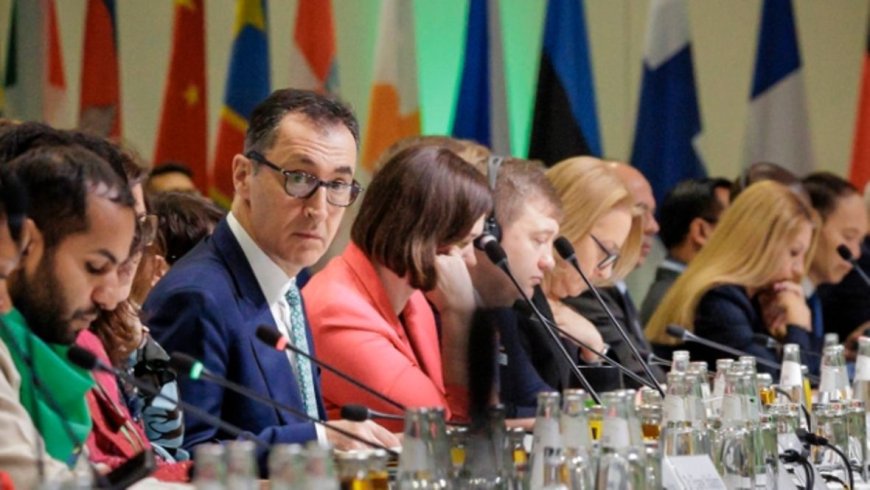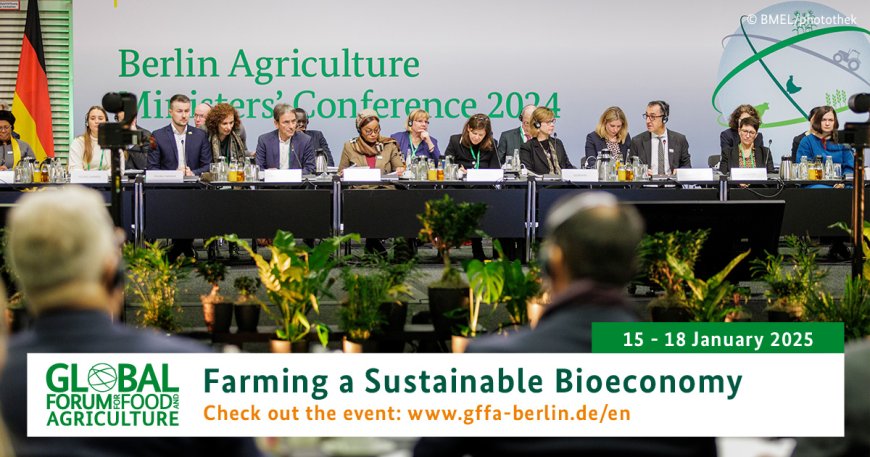Global Agriculture Ministers Unite to Promote Sustainable Bioeconomy at Berlin Conference
At the 17th Berlin Agriculture Ministers' Conference, 70 countries' agriculture ministers pledge to promote a sustainable bioeconomy. Use creative bio-based solutions to address climate change mitigation, biodiversity, and food security.

Berlin, January 18, 2025, Germany The 17th Berlin Agriculture Ministers’ Conference brought together agriculture ministers from almost 70 nations in a historic step to confront climate change, biodiversity loss, and global food security. The ministers, led by Cem Özdemir, the German Federal Agriculture Minister, vowed to promote a sustainable bioeconomy, stressing the necessity of creative, bio-based alternatives to fossil fuels.
 Credit:© BMEL
Credit:© BMEL
A Commitment to Sustainable Bioeconomy.
High-level representatives from 14 international organizations, including the World Bank, the World Trade Organization (WTO), and the United Nations Food and Agriculture Organization (FAO), attended the meeting, which ended with a final communiqué that outlined important pledges. The ministers decided to emphasize the sustainable bioeconomy's contribution to biodiversity preservation, climate change mitigation, and global food security.
Minister Özdemir emphasized the critical nature of the issue, observing, “One in ten people worldwide still goes to bed hungry. Wars, conflicts, and the climate crisis worsen this situation. Hunger undermines peace, creating a vicious cycle. As agriculture ministers, we need to take responsibility.”
The ministers approved the FAO’s Global Bioeconomy Partnership, a Germany-funded initiative designed to enhance international collaboration and knowledge sharing for advancing sustainable bio-based innovations. This partnership stems from the Global Initiative on Bioeconomy established during Brazil's G20 Presidency in 2024.
Key Outcomes of the Conference.
1. Sustainable Biomass Production:
The ministers reaffirmed their dedication to the Paris Climate Agreement and the Convention on Biodiversity, emphasizing the importance of sustainable food systems. They recognized the potential of agroecology, precision farming, and organic farming but acknowledged that there is no one-size-fits-all farming approach.
The bioeconomy currently sustains millions of lives globally, especially in areas such as sustainable pasture management, marine resources, and non-timber forest products. Ministers emphasized the promise of a blue bioeconomy, which taps into underutilized resources like algae, to generate extra value and income for fishing communities.
In their push for bioeconomy, the ministers emphasized food security, highlighting the importance of diversifying protein sources and lessening the strain on renewable biological resources. They pledged to promote a circular economy throughout all value chains.
The ministers highlighted the critical role of science, technology, and innovation in advancing the bioeconomy. They emphasized the necessity of financial access, especially for smallholder farmers, youth, Indigenous Peoples, and local communities.
Acknowledging possible disputes regarding biomass utilization, the ministers committed to emphasizing the right to sufficient food and sustainable development that respects planetary limits.
Addressing Challenges.
The conference discussed the recent foot and mouth disease (FMD) outbreak in Germany, the first occurrence since 1988. Minister Özdemir and BMEL State Secretaries delivered clear updates on the situation and explored possible export agreements considering the outbreak.
Looking Ahead
The Berlin Agriculture Ministers’ Conference represented a vital advancement in international cooperation on sustainable bioeconomy. As Minister Özdemir emphasized, “Sustainable agriculture and bioeconomy are essential, not optional, for ensuring a safe and dignified future. Together, we can foster positive opportunities and generate value rooted in sustainability, peace, and human dignity.”
For more information, visit the GFFA website.
 Kinyarwanda
Kinyarwanda
 English
English









































































